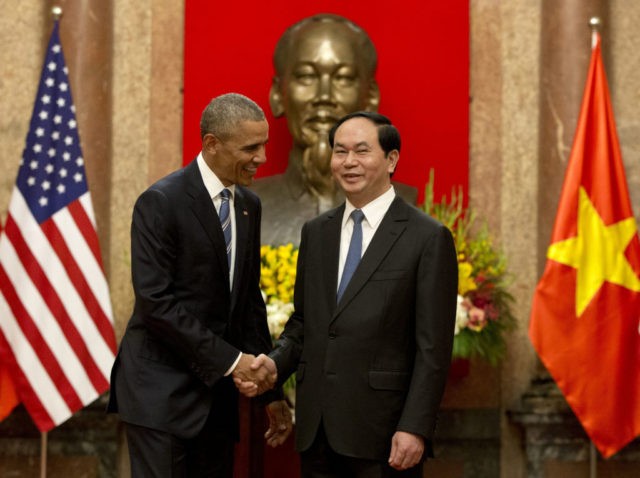President Barack Obama’s visit to Vietnam, in which he announced the end of an embargo on arms sales to the southeast Asian country, is an attempt to destabilize the region that exposes Washington’s lack of interest in human rights, according to Chinese state-controlled media.
A number of Chinese state outlets ran columns attempting to make sense of President Obama’s warm visit to Vietnam, a communist country. China’s Global Times had the harshest criticism, arguing that the end of the arms embargo was an attempt to strengthen Vietnam’s military at a time in which China has expanded its attempts to usurp Vietnamese territory in the South China Sea.
“Obama claimed that this move is not aimed at China, yet this is only a very poor lie which reveals the truth — exacerbating the strategic antagonism between Washington and Beijing,” the Global Times alleges, noting that President Obama explicitly rejected the notion that his visit to Vietnam had anything to do with China.
“When the US has an urgent need to contain China in the South China Sea, the standards of its so-called human rights can be relaxed,” the column reads, accusing America of “taking advantage of Vietnam to stir up more troubles in the South China Sea.”
An editorial in another Chinese publication, China Daily, takes a less hard-line stance against diplomacy between the U.S. and Vietnam, instead warning President Obama to be wary of working to “compromise China’s national interests and threaten regional security.”
“It is worrying to note the three-day visit has been described by some as a pivotal move in the US’ strategic rebalancing to curb the rise of China,” the column reads but offers charitably that “it remains to be seen whether such a worry is justified.”
President Obama made only passing mention of the South China Sea in his speech from Vietnam, using the same language the Department of Defense has in defense of the U.S. Navy’s continued freedom of navigation operations in international waters Beijing claims as its own, with little international support. “I reiterated that the United States will continue to fly, sail, and operate wherever international law allows, and we will support the right of all countries to do the same,” he said, referring to a meeting with leaders in Vietnam.
In February, using the same language (“the United States will continue to fly, sail, and operate wherever international law allows”), American military officials announced that the Navy would conduct “regular” freedom of navigation operations in the region. They announced that it is up to the Chinese government to become accustomed to them. On May 10, the USS William P. Lawrence sailed through the contested Spratly Islands, the third such exercise in the past year, triggering an incendiary response from Beijing.
The Philippines and Vietnam both claim parts of the Spratly Islands. The region China claims in the South China Sea overlaps with the borders of the aforementioned countries and Brunei, Taiwan, and Malaysia. Chinese construction crews have built several artificial islands in the Spratly and Paracel Islands in the past two years, installing both military and civilian facilities on the islands. China maintains that they are using the islands for civilian purposes of mutual benefit only, such as weather stations and emergency bases. Satellite evidence shows the Chinese government amassing missiles and military aircraft on the islands, however.
The Chinese Foreign Ministry responded to President Obama’s remarks from Vietnam with a warning to stay away from contested areas China claims as its own. Spokeswoman Hua Chunying told reporters Monday that “the U.S. needs to clarify whether it means legitimate freedom of navigation enjoyed by all countries in the South China Sea in line with the international law, or the freedom to go anywhere exclusively enjoyed by U.S. military planes and vessels.”
“Outside countries should not threat sovereignty and security of countries in the South China Sea region, undermine regional rules and order, and disrupt regional peace and stability in any form and under any excuses,” she added.
In addition to articles explicitly referring to President Obama’s visit to Vietnam, Chinese media have been pushing the narrative that Beijing has “ancient” claims to the disputed region. The People’s Daily, for example, published an article Tuesday citing an alleged “ancient” book with maps and directions around Scarborough Shoal as evidence that China has territorial claims on the region.
Just as President Obama appeared to avoid making direct statements challenging China’s claims in the region, Secretary of State John Kerry told reporters from Ho Chi Minh City Tuesday that the United States “don’t take a position on those claims” in the South China Sea and that Washington will continue to “simply [say], ‘Resolve it peacefully; resolve it in the rules-based order.’”

COMMENTS
Please let us know if you're having issues with commenting.